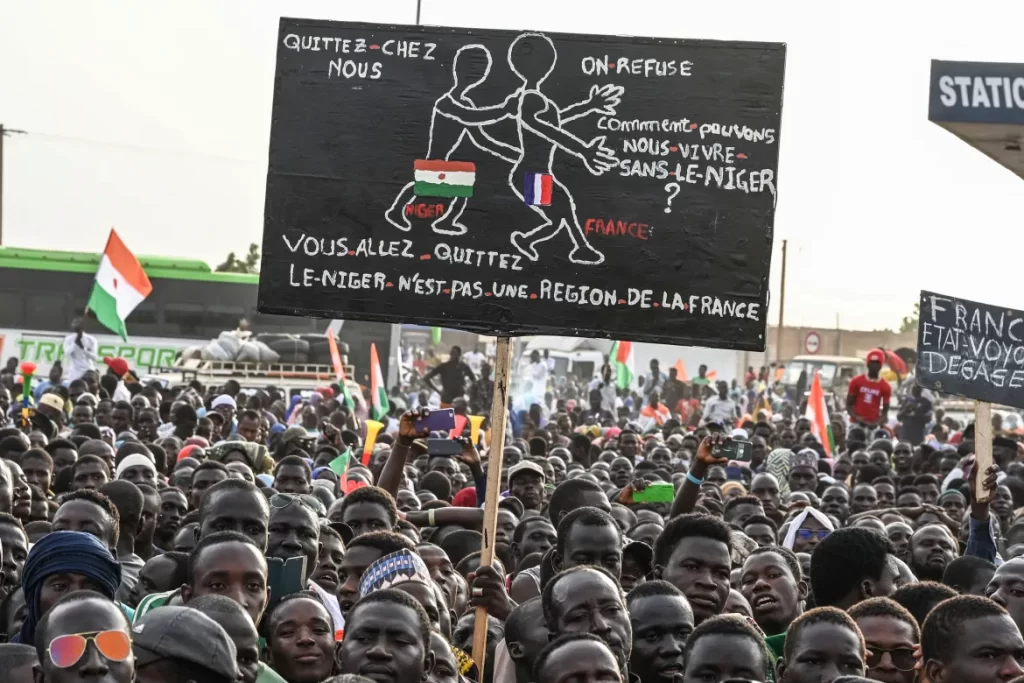In recent years, the evolving of France-Africa relations has taken center stage in international geopolitics. President Emmanuel Macron’s commitment to “reset” ties with Africa was a cornerstone of his foreign policy.
However, the winds of change are blowing from the African continent, with former colonies now asserting their agency in defining their relationship with Paris.
The Shift in Power Dynamics
Historically, France’s relationship with Africa was characterized by a colonial legacy that extended into the post-colonial era. However, the narrative is changing. African nations, once seen as passive recipients of French policy, are now actively deciding the nature of their ties with France.
This shift is evident in the rising anti-French sentiments in regions like the Sahel, where countries are demanding the withdrawal of French troops. Planeloads of French citizens are returning home. Anti-French demonstrations are peppered with Russian flags. French military and political interests are once again under attack in the Sahel as another onetime ally is toppled in a coup.
June 2023 military power grab in Niger follows those of Burkina Faso and Mali, all former French colonies, amid mounting anti-French sentiment over the past two years. Not so long ago, their leaders and military collaborated closely with Paris, as part of a five-nation regional G5 Sahel alliance — including Mauritania and Chad — fighting a spreading jihadist insurgency.
France’s military has left Mali and Burkina Faso and the 1,500 troops stationed in Niger face an uncertain future, although Paris says they will remain, at least for now. Citizens of those countries, who once cheered French forces for liberating cities and towns from militants, are now telling them to go home.
The Sahel region, particularly Mali, Burkina Faso, and Niger, has become a hotspot for these changing dynamics. Despite Macron’s promises, the Sahel has witnessed increasing instability, with jihadist groups gaining ground.
France’s military interventions, initially welcomed, have now become a point of contention. The perception of France as a liberating force has transformed into an image of an occupying power.
The Global Context
The changing dynamics are not just a result of internal African politics. Global powers like Russia and China are making inroads into the continent, offering an alternative to French influence. The chants of “Long Live Putin” in Niger’s capital, Niamey, and the growing Chinese investments in large development projects signify this shift.
These drastic and unprecedented geopolitical shifts further intensify the competition between foreign powers and are not conducive to ensuring long-sought-after security in the volatile Sahel region.
If we consider Russian President Vladimir Putin’s record in Syria, Libya, and the Central African Republic (CAR), there appears to be little hope that Russia will present a viable alternative to the failure of the West to help address the Sahel’s security crisis. In the face of Russian pressure, the Élysée is seemingly unable to find a way out of the current dire straits.
As this competition between outside powers gains momentum, especially in West Africa, Russia is on a relentless quest for influence. The rivalry between Russia and the Western powers, increasingly reminiscent of the Cold War, permeates every part of the African continent, and the Sahel is only the latest geopolitical arena for their competing interests and influence.
Reminiscent of the French, Russia’s determination to extract natural resources leaves little room for optimism about this newcomer. Moscow’s reliance on the Wagner Group private military company (PMC) — in Mali and elsewhere on the continent — also raises serious concerns about its potential role in conflict zones.
Wagner has been repeatedly involved in cases of political violence in Mali and CAR, an estimated half to two-thirds of which involve indiscriminate violence against civilians. U.N. experts have called for an independent investigation into the gross human rights abuses committed in Mali by both government forces and Wagner PMC since 2021.
The Sahel continues to be a land of competition, and the insecurity the region faces is only a pretext for competing powers to extend their influence. From arms sales to aid diplomacy, all avenues are being pursued. While the Élysée lacks a clear vision on how to refashion its presence in the Sahel, Moscow is powering ahead with an approach to Africa marked by geopolitical rivalry, not partnership
For France, the stakes are high. The instability in the Sahel poses not just an external threat but has internal implications as well. France’s engagement in the region is not just about historical ties but also about economic interests.
Major French corporations, especially in the oil, gas, and engineering sectors, have significant investments in Africa. A loss of influence in Africa could have economic repercussions for France.
Generally, the changing dynamics of France-Africa relations signify a new era in international relations. It’s a testament to the evolving agency of African nations and the shifting global power structures. While Macron’s intentions to reset ties were commendable, the ground realities are complex.
The future of France-Africa relations will depend on mutual respect, understanding, and a departure from neo-colonial tendencies. Only time will tell if this relationship can be truly reset or if it’s just old wine in new bottles.

